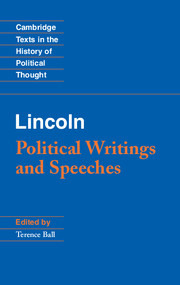Book contents
- Frontmatter
- Contents
- Preface
- Introduction
- Chronology
- Biographical synopses
- A note on sources and abbreviations
- Bibliographical note
- I Political Writings and Speeches
- II Notes and Fragments
- 36 On Government (1854?)
- 37 On Slavery (1854?)
- 38 On Slavery and Democracy (1858?)
- 39 On Pro-slavery Theology (1858)
- 40 On the Struggle against Slavery (c. July 1858)
- 41 On Racial (In)equality 1
- 42 On Racial (In)equality 2
- 43 The Declaration of Independence includes all men
- 44 On Slavery, Property, and the Constitution
- 45 On Labor and Capital 1 (c. 1846–7)
- 46 On Labor and Capital 2
- 47 On Labor and Capital 3
- 48 On Liberty
- 49 On the Thirteenth Amendment (abolition of slavery)
- Index
44 - On Slavery, Property, and the Constitution
Fifth Lincoln–Douglas Debate (October 7, 1858)
Published online by Cambridge University Press: 05 April 2013
- Frontmatter
- Contents
- Preface
- Introduction
- Chronology
- Biographical synopses
- A note on sources and abbreviations
- Bibliographical note
- I Political Writings and Speeches
- II Notes and Fragments
- 36 On Government (1854?)
- 37 On Slavery (1854?)
- 38 On Slavery and Democracy (1858?)
- 39 On Pro-slavery Theology (1858)
- 40 On the Struggle against Slavery (c. July 1858)
- 41 On Racial (In)equality 1
- 42 On Racial (In)equality 2
- 43 The Declaration of Independence includes all men
- 44 On Slavery, Property, and the Constitution
- 45 On Labor and Capital 1 (c. 1846–7)
- 46 On Labor and Capital 2
- 47 On Labor and Capital 3
- 48 On Liberty
- 49 On the Thirteenth Amendment (abolition of slavery)
- Index
Summary
The essence of the Dred Scott case is compressed into the sentence which I will now read: “Now, as we have already said in an earlier part of this opinion, upon a different point, the right of property in a slave is distinctly and expressly affirmed in the Constitution.” I repeat it, “The right of property in a slave is distinctly and expressly affirmed in the Constitution!” What is it to be “affirmed” in the Constitution? Made firm in the Constitution – so made that it cannot be separated from the Constitution without breaking the Constitution – durable as the Constitution, and part of the Constitution. Now, remembering the provision of the Constitution which I have read, affirming that that instrument is the supreme law of the land; that the Judges of every State shall be bound by it, any law or Constitution of any State to the contrary notwithstanding; that the right of property in a slave is affirmed in that Constitution, is made, formed into and cannot be separated from it without breaking it; durable as the instrument; part of the instrument; what follows as a short and even syllogistic argument from it? I think it follows, and I submit to the consideration of men capable of arguing, whether as I state it in syllogistic form the argument has any fault in it:
Nothing in the Constitution or laws of any State can destroy a right distinctly and expressly affirmed in the Constitution of the United States;
- Type
- Chapter
- Information
- LincolnPolitical Writings and Speeches, pp. 233 - 234Publisher: Cambridge University PressPrint publication year: 2012



